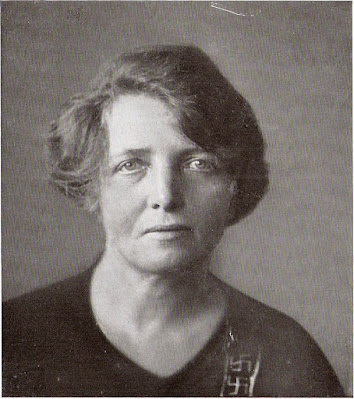Why Mathilde Ludendorff's philosophy rejects miracles
### Why Mathilde Ludendorff's Philosophy Rejects Miracles: A Rational Path to Divine Cognition Mathilde Ludendorff's *Triumph of the Immortal Will* (1924) presents a philosophical system that seeks to reconcile human existence with a profound sense of the divine, grounded in scientific insight and evolutionary history. Her "God-Cognisance" (Gotterkenntnis) is not a faith-based creed but a cognition derived from reason, intuition, and empirical observation, emphasizing humanity's unique role as the potential consciousness of God. Central to this philosophy is a rejection of miracles—supernatural interventions defying natural laws—as incompatible with her worldview. Miracles, in Ludendorff's thinking, represent remnants of primitive superstition, alien religious fraud, and a misunderstanding of causality, time, and space. They undermine the autonomous human will to achieve perfection and immortality through "God-living" (Gotterleben), a conscious realization of divine wishes before death. This essay explores the reasoning behind her rejection, drawing from the nine chapters of her work, which collectively build a case for a rational, non-miraculous redemption rooted in evolutionary truth and inner divine potency. #### The Foundation in Science and Natural Laws: Miracles as Violations of Causality Ludendorff's philosophy is built on a synthesis of modern scientific discoveries, particularly evolution, astronomy (Copernicus), and philosophy (Kant, Schopenhauer). In Chapter 1, she critiques Christianity and other religions as "folk-frauds" derived from outdated myths (e.g., Indian legends historicized into Jesus), perpetuating superstitions like revelations and holy inspirations. Miracles, as absurd events defying logic (e.g., virgin births, resurrections), are dismissed as products of "illogical" or "anticausal" thinking, incompatible with Kant's distinction between the phenomenal world (governed by time, space, causality) and the noumenal "Thing Itself" (beyond reason's grasp). Chapter 2 deepens this by rejecting Darwin's mechanical "selection of the fittest" for a purposeful "Immortal-Will" driving evolution toward consciousness. Miracles imply external divine interference, but Ludendorff sees the universe as unified by inner laws—wills to preservation and beauty—operating causally without supernatural breaks. Her critique of materialism (e.g., Schopenhauer's vague metaphysics) underscores that true cognition harmonizes faith with knowledge; miracles, as "super-causal" anomalies, shatter this harmony, representing decay rather than progress. In Chapters 3 and 4, evolution from potentially immortal unicells to mortal multicells (introducing natural death for higher consciousness) reveals a lawful process. Death is not punishment or miracle but enables birth and ascent; personal immortality myths (heavens/hells) are fallacious escapes from this reality. Miracles, as divine overrides of death or nature (e.g., resurrections), contradict this inexorable causality, reducing God to a capricious "personal" entity rather than the immanent "Will" in all things. Ludendorff's thinking here draws from Kant: Reason's limits prevent grasping the super-causal, making miracles "preposterous" claims of absurdity as revelation. Her rejection stems from demanding empirical, rational consistency; miracles, unprovable and illogical, foster dependency on fraud, not self-reliant cognition. #### Critique of Religions and Myths: Miracles as Superstition and Fraud Ludendorff views religions as fear-based distortions of natural phenomena, evolving from soul-cults (fear of dead/spirits) to myths misinterpreting death as sin/punishment (Chapters 1, 3). Christianity, a "Jewish fraud" historicizing Indian legends, perpetuates miracles (e.g., Jesus' acts) as "historical facts" to enforce hatred and control, warping souls via fear (hell) and false hope (redemption). In Chapter 5, divine wishes (goodness, beauty, truth, discriminated love/hate) are timeless/spaceless/purposeless, experienced via intuition/God-living, not miraculous revelations. Miracles personify God as intervening deity, contradicting her impersonal "Thing Itself" manifested through will. Chapter 9 reinforces: Perfection via free will/self-creation rejects Christian "grace"/forgiveness miracles; irrevocableness demands responsibility, not supernatural absolution. Her reasoning: Miracles stem from primitive non-knowledge (e.g., death as chastisement), perpetuated by priesthoods abusing superstition for tyranny. Evolution dispels these as fallacies; true God-Cognisance harmonizes with science, rejecting "absurdities" as divine proofs. Ludendorff's Nordic ancestors avoided such myths, focusing on cosmic laws without hell/priests. #### God-Cognisance and Divine Wishes: Miracles Undermine Autonomous Redemption Ludendorff's core: God as inner nature ("Will"/divine wishes) in all things, consciously realized in humans via God-living before death (Chapters 5, 9). Immortality is spiritual participation in timeless beyond, not miraculous afterlife. Miracles imply external God overriding laws, but her God is immanent, evolving through causal processes toward human consciousness. Chapters 6-8: Struggle-for-life/minne spiritualized by divine wishes bridge earthly/divine without supernatural aid. Morals demand discrimination, not indiscriminate love/forgiveness (miracle-like grace). Perfection via self-will rejects miraculous salvation; errors (e.g., asceticism) pervert instincts, but cognition redeems rationally. Thinking: Miracles foster passivity/dependency, contradicting human prerogative as God's consciousness (Chapter 9). Evolution's aim—conscious divine realization—requires active will, not passive miracles. Her philosophy empowers via cognition, not faith in wonders. #### Conclusion: Rational Redemption Over Miraculous Salvation Ludendorff rejects miracles as antithetical to her rational, evolutionary God-Cognisance, viewing them as superstitious relics violating causality, perpetuating fraud, and undermining human autonomy. Her thinking prioritizes scientific harmony, inner divine will, and pre-death perfection, transforming Immortal-Will into conscious God-living. By dethroning miracles, she elevates humanity to cosmic purpose-bearers, fostering self-reliant morals over dependent faith. In a post-Darwinian world, her philosophy offers cognition-based redemption, where truth, not wonders, triumphs.



Comments
Post a Comment